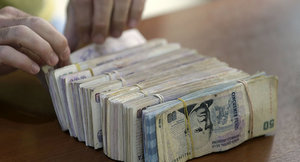por Federico Poore
The Essential, 14-02-2019
Argentina is a country so riven by crises that once the economy seems to stabilize for a few months everyone begins calling it a veranito (little summer). The country is certainly not enjoying one right now – it’s still dealing with the worst recession since at least 2009 – but many analysts have begun to talk about the “financial veranito”.
There are three main reasons for this (or so the government believes):
— The Federal Reserve’s decision to stop raising interest rates, which appears to be largely beneficial for emerging markets.
— The US-China trade war truce, a 90-day “peace period” which ends March 2 but could be extended.
— An improving Brazilian economy amid optimism that new right-wing President Jair Bolsonaro will drive through a set of ambitious economic reforms.
As a result, the Buenos Aires stock exchange celebrated its best month in over three years in January as the country risk index fell from 817 to 674 basis points. The Abeceb consultancy firm reported a trade surplus with Brazil, the country’s main commercial partner, for the second straight month. The relief came after a disastrous 2018, when the peso weakened more than any other currency in the world and forced a return to the International Monetary Fund.
So how is the country actually doing?
It’s true that a weaker peso has allowed Argentina to reverse the foreign currency outflows eating away at the economy. However, a closer look at Argentina-Brazil trade flows reveals that January’s positive figures are primarily the result of a huge drop in imports from that country (43 percent down from last year) rather than the export-led recovery the government has prophesied for 2019.
Meanwhile, the famous seven-day notes known as ‘Leliq,’ which last October sold at an average interest rate of 73 percent, have now dropped below the 50 percent threshold. “So far, the [Central Bank, or BCRA] delivered on its ambitious plan to keep monetary base stable, and we expect it to remain committed to this policy”, wrote Bloomberg Economics’ Adriana Dupita. However, she added the success of such policies is “rather dependent on both international market conditions (out of BCRA’s control) and the prospects of fiscal policy (influenced by the forthcoming Presi- dential election in October). Hence, even if BCRA plays by the book, volatility may be high in both currency and interest rates.”
And then there’s the real economy.
Industrial output slid by a whopping 15 percent in December, worse than expected. Consumer pric- es rose 47.6 percent in 2018 and many analysts believe monthly in- flation for the first quarter of this year will run between 2.5 and 3 percent. Bringing down inflation is “harder than I imagined,” Presi- dent Mauricio Macri conceded last week.
Salary hikes are expected to match inflation in 2019, which is set to in- crease by around 30 percent, but this means workers won’t make up for the massive loss in purchasing power suffered in previous months. “With new monthly inflation esti- mates, it is clear the minimum sal- ary will not recover what was lost in 2018,” said Nicolás Saldías, a researcher at the Wilson Center. According to the Indec statistics bureau, salaries relative to infla- tion declined by 17 percent in the twelve-month period from Novem- ber 2017 to November 2018.
Meanwhile, many Argentines are heavily indebted with credit cards, and annual interest rates hover at over 100 percent. The La Nación newspaper reported this week that more and more people are taking out personal loans to pay for their utilities.
New IMF review
On Monday, a technical mission team from the International Monetary Fund (IMF) arrived in Buenos Aires to carry out the third review of the institution’s three-year loan agreement with the Macri administration.
Over the next few weeks, the team is expected to monitor progress on the terms agreed under the deal before approving disbursement of the latest installment of the financing package, worth some $11 billion. According to Clarín, the mission led by Roberto Cardarelli has expressed its worries about the drop in tax revenue resulting from the recession.
This new mission will be more ‘political,’ as IMF representatives are expected to meet with a broad range of politicians and union leaders ahead of the October presidential elections. The photo-ops with opposition members began this Wednesday as the IMF team met with Salta Governor Juan Manuel Urtubey, a moderate Peronist.
Though his approval ratings sit at around 34 percent, Macri has little choice but to deliver on the austerity measures he agreed to with the IMF. The incumbent is now forced to stick to a there-is-no-alternative narrative, betting voters prefer him to former president Cristina Kirchner, a leftist-populist and possible runoff contender.
With less than nine months to elections, the best Macri can hope for is a fragmented opposition. Lucky for him, the latest polls show this is the case so far.
